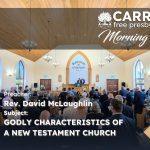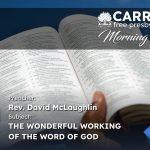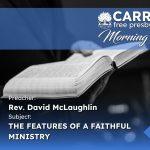Date: SUN 11:30am 6th July 2025
Preacher: Rev. David McLaughlin
Bible Reference: 1 Thessalonians 1:9-10
For they themselves shew of us what manner of entering in we had unto you, and how ye turned to God from idols to serve the living and true God; And to wait for his Son from heaven, whom he raised from the dead, even Jesus, which delivered us from the wrath to come.
Sermon Summary: Godly Characteristics of Genuine Conversion
Scripture Reading: 1 Thessalonians 1:1–10
The sermon, based on 1 Thessalonians 1:9–10, explores the theme of the godly characteristics of genuine Christian conversion, contrasting true faith with spiritual deception. The preacher draws parallels between material scams and spiritual deception, warning that Satan, described as a liar and murderer (John 8:44), seeks to deceive people not for their money but for their souls. The sermon underscores the importance of discerning genuine conversion in a world filled with false religions, cults, and misleading teachings.
Introduction: The Reality of Spiritual Deception
The preacher begins by highlighting the prevalence of scams in the material world, such as fraudulent phone calls or letters promising money or posing as legitimate authorities. These scams manipulate people into believing falsehoods, much like Satan’s spiritual deception. Quoting John 8:44, the preacher describes Satan as the “father of lies,” whose goal is to lead people astray from the truth of the gospel. In the spiritual realm, false religions, cults, and charlatans distort the truth, leading many to falsely believe they are Christians. The preacher cites Matthew 7:22–23, warning that many who profess faith in Christ will be rejected by Him because their conversion is not genuine.
Context of 1 Thessalonians
The sermon focuses on Paul’s first letter to the Thessalonians, a young church (approximately 11 months old) in Macedonia. Paul, along with Silvanus and Timothy, writes to commend the Thessalonian believers for their faith. The preacher highlights the traditional greeting in 1 Thessalonians 1:1–2, which invokes grace and peace, and notes Paul’s gratitude for the church’s godly lifestyle, marked by their “work of faith,” “labour of love,” and “patience of hope” (1:3). Paul affirms their election by God (1:4), not through divine revelation or intuition, but through the observable evidence of their transformed lives.
Evidence of Genuine Conversion
The preacher explains that Paul’s confidence in the Thessalonians’ election stems from the powerful impact of the gospel in their lives (1:5). The gospel was not merely preached in words but came with the power of the Holy Spirit, resulting in their transformation. This transformation made them examples to believers in Macedonia and Achaia, as their faith spread widely (1:6–8). The sermon then focuses on verses 9–10, identifying four godly characteristics of genuine conversion:
- Genuine Receiving of the Gospel
The Thessalonians welcomed the gospel with open hearts and minds, receiving it not only as a message but with the power and assurance of the Holy Spirit (1:5). The preacher likens this to welcoming an evangelist into one’s home with eagerness to hear God’s Word. He references Acts 14:27, 16:14, 1 Corinthians 16:9, and 2 Corinthians 2:12 to illustrate how God opens doors and hearts to the gospel. The gospel is not a self-help scheme but a message of salvation from sin and the wrath to come (Romans 3:23, 6:23; John 3:16). True reception of the gospel convicts individuals of sin, reveals their need for a Saviour, and transforms them into new creatures (2 Corinthians 5:17). - Genuine Turning to the True God from Idols
The Thessalonians turned from idol worship to serve the living and true God (1:9). This was a deliberate, decisive, and delightful turning, described as true repentance and conversion (Acts 3:19). The preacher illustrates this with the analogy of a driver heading in the wrong direction (e.g., north instead of south) who must make a U-turn to reach the correct destination. Similarly, true conversion involves turning from idols—whether physical (as in Thessalonica) or internal, such as the “idol of self.” The preacher warns that many professing Christians enthroned self, pursuing personal ambitions and desires rather than submitting to God. True conversion requires hating what was once loved (sin) and loving what was once hated (righteousness). - Genuine Serving of the Living and True God
The Thessalonians served God as willing bondslaves, fully surrendered to His will (1:9). The preacher explains that a slave belongs entirely to their master, with no personal plans or will apart from the master’s. Christians, redeemed by Christ’s blood (1 Corinthians 6:19–20), are called to serve God out of love and gratitude, not duty or reluctance. This service is a 24/7 commitment, encompassing prayer, Bible study, practical church duties, and loving others. The preacher contrasts the living and true God with dead idols, emphasising that serving God is a privilege and delight, motivated by His love and sacrifice. - Genuine Waiting for God’s Son
The Thessalonians lived in expectation of Christ’s return (1:10), a major New Testament theme mentioned approximately every 13 verses. The preacher stresses that Christ’s second coming is certain, bodily, and visible (Acts 1:11; Revelation 1:7), and believers should live in light of this reality. Genuine Christians long to see Christ, be with Him, and be like Him, hating sin and loving righteousness. The preacher references Robert Murray M’Cheyne, who lived with daily anticipation of Christ’s return, and encourages believers to adopt the same mindset.
Conclusion: A Call to Examine One’s Faith
The sermon concludes by urging listeners to examine their faith against these four characteristics. True conversion is marked by receiving the gospel with power, turning from idols to God, serving Him wholeheartedly, and waiting expectantly for Christ’s return. These traits distinguish genuine Christians from those deceived by false professions of faith. The preacher prays that God’s Word will be applied to the hearts of the congregation, thanking them for their patience and attention.
Subscribe to the podcast here:
Spotify Podcasts | Apple Podcasts | Pocket Casts
Email | RSS | more information here








